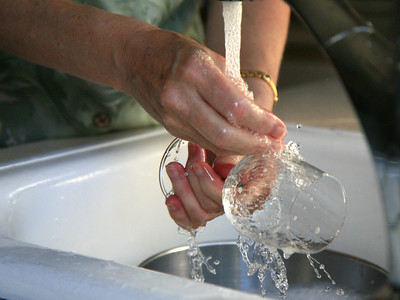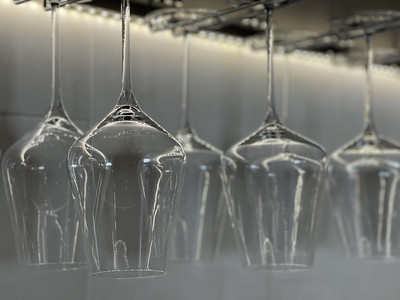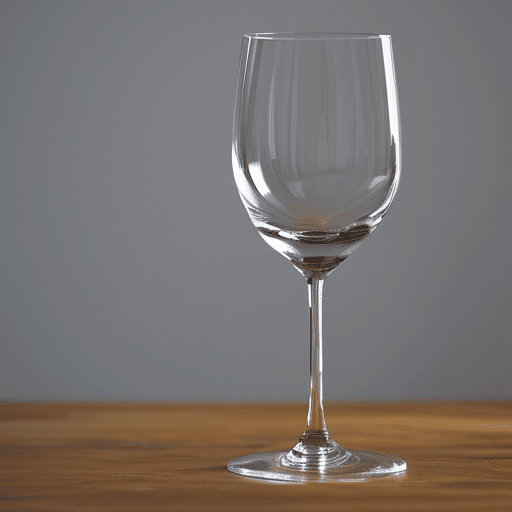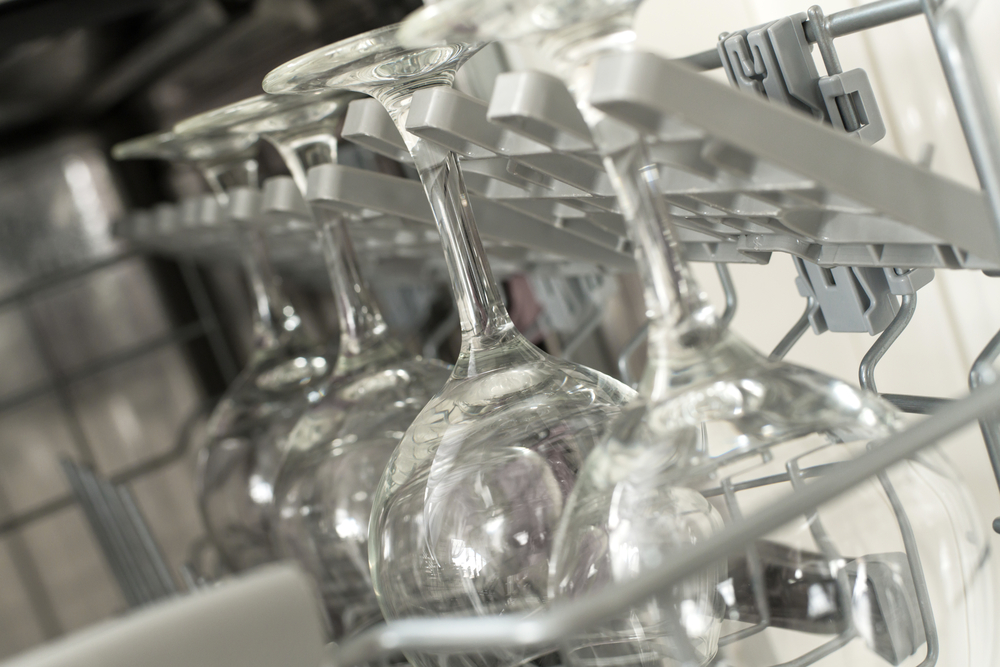Whether you are enjoying your next Pinot Noir from a simple wine glass or an imported crystal tulip bowl, every wine enthusiast wants to ensure the glasses are exquisitely clear and free of any blemish.
There are various options or solutions on how to clean wine glasses, but if done incorrectly, remaining stains or hard water can alter the aroma of your next pour. If you are taking the time to painstakingly select the perfect bottle of wine for a special occasion, you’d also want a spotless set of wine glasses to go with it.
This article will cover a few things to consider when cleaning a wine glass. You’ll learn about the different ways you can address stains or lipstick marks and cloudy wine glasses. Additionally, you’ll find out if it’s safe to put wine glasses in the dishwasher and whether or not a microfibre towel is worth having.
Hand Washing

If you use exceptionally fragile glassware, such as hand-blown large bowl glass creations or fine crystal long stem flutes, washing your wine glasses by hand is highly recommended. There is a range of wine glass cleaning tools, such as wands, countertop brushes, and more, that you can use if you want to lessen the amount of time you touch the wine glass yourself.
To make the washing process quicker, soak your wine glasses in hot water with a small drop of unscented soap. Straight vinegar or vinegar and baking soda mixture can also be used in place of the soap. If you’ve no idea how to clean cloudy wine glasses, vinegar is especially good for helping to clear them up or deal with a stained wine glass.
When hand washing your wine glasses in the sink, focus more on the exterior and rim of the wine glass. The inside of the bowl should have only had wine in it and won’t need a thorough wash unless it is stained from red wine or leftover wine. If this is the case, you can swirl some dish soap and water around the inside or use decanter beads to help remove the stain.
Hold the glass securely by cradling the bowl when you wash. Attempting to hold the stem when adding pressure from washing can cause damage, especially on hand blown pieces that are much more delicate. Additionally, wine glasses will become very slippery from soapy water. Hence, ensure a secure hold on the wine glasses to prevent dropping them.
Hand Washing Tips
Use Unscented Soaps or White Vinegar
There is a wide range of soaps and dish detergents you can use to wash your wine glasses. However, we recommend using unscented soap or white vinegar to prevent any lingering scent.
Decanter Beads
While these stainless steel beads are specifically made for cleaning decanters, you can also use them to remove stubborn stains in wine glasses. Be gentle when using the beads on especially delicate glass or crystal.
Clean Sponges
Sponges are an excellent choice for cleaning the bowl of your glassware but can pick up and hold odours from other washings. Replace your sponges often to prevent this build-up, or only use them for wine glasses and nothing else.
Hot Water
Using hot water when you hand wash your stemware is a great way to help loosen up stubborn stains from red wine or leftover wine. Hot water doesn’t need to be boiling but should be hot enough to break down any leftover wine build-up on the glass.
Automatic Dishwasher
Hand washing is normally recommended for most wine glasses, especially hand-blown ones or delicate crystals. However, if you have durable glass that can withstand a bit of abuse, you can wash these glasses in the dishwasher.
It’s best to use the top dish rack as the water will not be as forceful here. But if you cannot fit your glassware there, you can use the bottom racks. Ensure the glassware is secured in the rack and won’t jostle into another glass and crack. Some dishwashers may have clips you can use to secure the glass to the rack to prevent bumping into other things, so be sure to check for those.
Run the dishwasher on your normal warm water cleaning setting. It is okay to use soap or simply do a warm water wash with no soap added. If your dishwasher has an air-dry setting, use that to dry your glasses. However, be prepared to polish out some remaining minuscule watermarks or detergent particles to make your glasses look crystal clear.
Dishwasher Tips
Use the Top Rack
This is the safest place for your wine glasses, but they may not fit here if you have long-stemmed ones. The lower rack will have to be used instead. Either placement will offer the same level of cleaning and provide a good rinse.
Prevent Jostling
Make sure to secure your glasses on the rack. Check to see if there are built-in clips you can use to help secure them to the rack. Glasses that clink into other glasses during the cleaning or rinsing process can crack or shatter in the dishwasher.
Soap is Optional
If you use the dishwasher to clean your wine glasses, you may decide to use soap or avoid it altogether. Either option is acceptable and will leave you with clean glasses! You can even add vinegar to your dishwasher’s soap compartment as a rinse aid.
Prepare for Water Spots
While a dishwasher can use hot water for cleaning and a quick rinse, it’s not uncommon for water spots to be left behind. Be prepared to do a second rinse or polish to remove them.
Air Drying or Hand Drying

Washing your wine glasses is just the first step to cleaning them. You need to dry them afterwards. This is arguably the most important part, as leftover odours and water stains can ruin a good presentation of wine at your next tasting or dinner party.
If your water is mineral-rich and hard, air-drying your glasses is not recommended. As the water droplets dry, water stains and other blemishes will be left behind on the glass or crystal. This will create a cloudy look and pesky stains on the surface, which can obscure the colour of your wine.
Instead, use a microfibre cloth or other lint-free towel to dry wine glasses right after being washed. A microfibre cloth or lint-free material is recommended over a cotton towel, as the former will not leave behind fibres and random fuzz. Additionally, they can remove grease that might have slipped through during the wash, such as fingerprints or lipstick stains.
If your water is not prone to leaving behind mineral deposits, air drying is a valid option for your wine glasses. However, it is advised that you use a drying rack with paper towels below it. Leaving the glasses upside down on a drying towel will trap moisture inside the bowl, creating a build-up of damp towel odours.
With a drying rack, the air can circulate up into the upturned bowl of the glass. The only downside to using a drying rack is it can take up a fair bit of counter space, so it may be in the way until the glasses are thoroughly dried and free from water spots.
Drying Tips
Use Clean Towels
Drying with a dirty or damp towel can transfer odours onto your wine glasses. This may not be noticeable right away but can be off-putting when attempting to test the aroma or taste of your next glass of wine.
Cradle the Glass
When drying, do not handle the wine glass by its stem. Instead, cradle the bowl of the glass with a towel while you gently wipe it dry. This helps prevent the risk of breaking the glass stem where it connects to the bowl.
Steam and Polish

If you’re just learning how to polish wine glasses, this is an excellent way to eliminate every imperfection, from fingerprints to water stains. Steam the glass gently over a teapot and buff the glass or crystal stemware with a microfibre polishing cloth to create a brilliant shine.
For a Flawless Shine
Ensuring your wine glasses are pristine and ready for use is highly important. Leftover odours or water stains can obscure the look of the wine and sour the aroma. Whether you are using a simple glass stemless tumbler or a fine crystal flute, washing and drying should be performed in the same manner.
Once you have a spotlessly clear set of wine glasses, you can rest assured knowing your next wine tasting will not be hindered by unsightly hard water stains, fingerprint blemishes, or unappealing damp towel odours.
If you are just learning how to clean wine glasses, their maintenance is not as difficult as you may think. But cleaning wine glasses in large numbers can seem daunting if you have to hand wash them.
After you have a nice set of clean wine glasses, however, you’ll feel pride in being able to taste and admire your next pour through crystal clear stemware.

